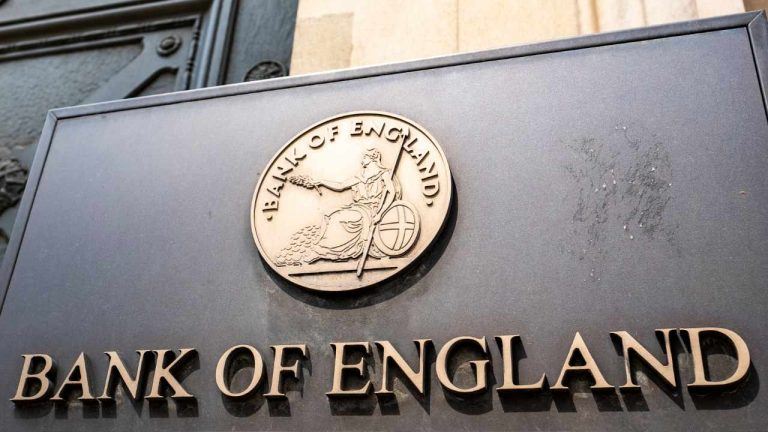
The New York regulator’s Transatlantic Regulatory Exchange program would allow the NYDFS to exchange senior staff experienced in digital assets with those at the Bank of England.
New York Department of Financial Services (NYDFS) Superintendent Adrienne Harris announced an exchange program that will allow the regulator to learn more about how foreign agencies handle issues with emerging payments and digital assets.
In a Jan. 13 notice, Harris said the Transatlantic Regulatory Exchange (TRE) would begin with an exchange of senior staff experienced with digital assets between the NYDFS and Bank of England. According to the NYDFS superintendent, the program was “critical for regulatory harmonization.”
Exchange program announcement. Source: NYDFS

One of the oldest central banks in England is giving companies until March 2025 to disclose their exposure to digital assets. In a new announcement, The Bank of England says that the Prudential Regulation Authority (PRA) – the UK’s financial regulator – is looking to gather data on firms’ current and future exposure to crypto […]
The post One of England’s Oldest Central Banks Gives Firms Till March 2025 To Disclose Crypto Exposure appeared first on The Daily Hodl.
 The Bank of England cautions it could deploy a digital currency if commercial banks falter, signaling a potential upheaval in the future of money. Digital Payments Showdown: BOE Set to Roll Out CBDC if Banks Slip Behind Bank of England (BOE) Governor Andrew Bailey shared his outlook on the evolution of digital payments in a […]
The Bank of England cautions it could deploy a digital currency if commercial banks falter, signaling a potential upheaval in the future of money. Digital Payments Showdown: BOE Set to Roll Out CBDC if Banks Slip Behind Bank of England (BOE) Governor Andrew Bailey shared his outlook on the evolution of digital payments in a […] Bitmex co-founder Arthur Hayes is optimistic about bitcoin’s future, citing recent interest rate cuts by central banks. He believes further rate cuts by the U.S. Federal Reserve, Bank of England, and European Central Bank could expand the money supply and drive inflation. Hayes argues that while inflation may negatively impact some businesses, it would benefit […]
Bitmex co-founder Arthur Hayes is optimistic about bitcoin’s future, citing recent interest rate cuts by central banks. He believes further rate cuts by the U.S. Federal Reserve, Bank of England, and European Central Bank could expand the money supply and drive inflation. Hayes argues that while inflation may negatively impact some businesses, it would benefit […]

This marks the bank’s first interest rate cut in over four years, with the last rate cut occurring in March 2020.
Bitcoin price could see more upward momentum from the latest interest rate decision of the British central bank.
The Bank of England announced an interest rate cut of 0.25%, to the current 5% mark, on Aug. 1, bringing an end to one of the longest periods of heightened interest rates.
Bitcoin's (BTC) price could benefit from the surprise interest rate cut since economists were split on whether the bank will cut or hold its interest rates steady.
 The Bank of England (BOE) is urging UK banks to expedite their digital payment solutions as cash use declines. The BOE’s recent paper highlights the need for innovations that allow direct payments from bank accounts, bypassing credit and debit cards, to save time and costs for consumers and retailers. The British central bank is developing […]
The Bank of England (BOE) is urging UK banks to expedite their digital payment solutions as cash use declines. The BOE’s recent paper highlights the need for innovations that allow direct payments from bank accounts, bypassing credit and debit cards, to save time and costs for consumers and retailers. The British central bank is developing […] According to local media reports, the Reserve Bank of India has repatriated 100 tonnes of gold that was held in the vaults of the Bank of England. The operation, carried out in special circumstances due to the quantity of gold moved, may be repeated as India seeks to hold more gold domestically for logistical reasons […]
According to local media reports, the Reserve Bank of India has repatriated 100 tonnes of gold that was held in the vaults of the Bank of England. The operation, carried out in special circumstances due to the quantity of gold moved, may be repeated as India seeks to hold more gold domestically for logistical reasons […]

The U.K. Parliamentary Committee fears that an official launch will demand a significant investment, adding that “It is not clear to us at this stage whether the benefits are likely to outweigh these risks.”
The United Kingdom Parliamentary Committee, House of Commons, has asked the Bank of England and Treasury to carry out further consultative work to determine the benefits of launching a digital pound.
The groundwork and tests related to the launch of a central bank digital currency (CBDC) incurred significant costs for the Bank of England and Treasury, according to a House of Commons Treasury Committee report.
“It is important that the Bank of England and Treasury keep control of these costs to avoid spending more than necessary on a digital pound that might not proceed to being built.”
The ongoing tests of an English CBDC highlighted numerous benefits concerning issuance, distribution and privacy, among others.
Related: UK House of Lords passes bill to seize stolen crypto
The committee asked England’s central bank to avoid speculating that “a digital pound can fix problems it can’t” and to ensure that a digital pound does not worsen the financial exclusion precedent set by the fiat economy.
While the Bank of England and HM Treasury see the need for a digital pound in the future, committing to build the infrastructure for one requires further preparatory work.
Magazine: Real AI use cases in crypto: Crypto-based AI markets, and AI financial analysis

It’s not expected to come into force until 2025, but new publications from the FCA and BOE shed light on regulators’ thinking.
A suite of documents was published in the United Kingdom on Nov. 6 that concern stablecoin regulation. The Financial Conduct Authority (FCA) released a discussion paper, as did the Bank of England (BOE). To accompany those, the BOE’s Prudential Regulatory Authority (PRA) released a letter to CEOs of deposit-taking institutions, and the BOE released a “cross-authority roadmap” to link them together.
His Majesty’s Treasury set the stage for the flurry of releases on Oct. 30 with a short document previewing plans for regulation. The FCA paper explored the same ground in much greater detail.
Stablecoin regulation is the first step to broader crypto asset regulation, the FCA said. The discussion paper outlined potential retail and wholesale stablecoin use cases. Its discussion included auditing and reporting, the backing of coins owned by the issuer and the independence of the backing assets’ custodian.
The paper concentrated on ways in which the principle of “same risk, same regulator outcome” could be applied. It proposed using the existing client assets regime as the basis of rules on redemption and custodianship and the senior management arrangements, systems and controls sourcebook to organize business affairs. There are existing operational resilience and financial crime frameworks, as well as numerous others.
The UK FCA is proposing that stablecoin holders have the right of direct redemption. Which makes issuers a lot more like banks and will raise a bunch of AML/KYC issues for issuers pic.twitter.com/lZLQXlmemu
— Sean Tuffy (@SMTuffy) November 6, 2023
The FCA is considering adapting existing prudential requirements for regulated stablecoin issuers and custodians from the existing regime and making them applicable to other crypto assets eventually.
The BOE paper looked at the use of sterling-based retail-focused stablecoin in systemic payment systems. It considered transfer function and requirements for wallet providers and other services, and it partially overlapped with the FCA’s discussion of stablecoin issuers and deposit protection.
Related: UK crypto businesses to comply with FATF Travel Rule beginning in September
The BOE will “rely on” the FCA to regulate custodians, it said, but it left open the possibility of imposing requirements of its own, if necessary. It pointed to Anti-Money Laundering and Know Your Customer requirements for unhosted wallets and off-chain transactions as potential regulatory sore points.

The BOE PRA letter emphasized that the difference between “e-money or regulated stablecoins” and other types of deposit have to be clearly maintained:
“With the emergence of multiple forms of digital money and money-like instruments, there is a risk of confusion among customers, especially retail customers, if deposit- taking entities were to offer e-money or regulated stablecoins under the same branding as their deposits.”
Deposit-taking institutions should limit their innovation to deposits. Issuance activities should have distinct branding, the PRA advised. An issuer that wants to take deposits as well should move quickly and involve the PRA in the process. Finally, innovations in deposit taking are also subject to rules and requirements, it reminded.

The BOE roadmap included a timeline, with an implementation date of 2025.
Magazine: Unstablecoins: Depegging, bank runs and other risks loom

The United Kingdom government could rebalance the power between the Bank of England and the country’s principal financial regulator, the Financial Conduct Authority.
The United Kingdom government could rebalance the power between the Bank of England (BoE) and the country’s principal financial regulator, the Financial Conduct Authority (FCA), in the former’s favor, according to a 40-page consultation response published by His Majesty’s Treasury on Aug. 7.
The British government launched the consultation under the headline “Payments Regulation and the Systemic Perimeter” in 2022 to get market proposals on reforming the BoE payments perimeter, given the evolution of financial stability risks.
The final paper sets out some measures for regulating the so-called “systemically important stablecoins”. The main takeaway is the government’s intention to secure the co-supervision over stablecoins as a joint venture of both BoE and the FCA. First time such regime was suggested in 2022’s stablecoins consultation response document.
Related: UK Law Commission recommends ‘distinct’ legal category for crypto
However, the BoE would be given a power to prevent the FCA from taking action in relation to a stablecoin provider, and the Prudential Regulation Authority (PRA) would also get a power to keep the FCA away from a specified action, “if it were to give rise to financial stability concerns.”
As the document specifies, most respondents accepted the need for Bank primacy towards the supervision of future systemically recognised payments entities. However, some of them demanded clarity on the limitations of its power.
In July, Andrew Bailey, a BOE governor, stated that both cryptocurrencies and stablecoins fail basic tests of singleness and settlement finality, and hence should not be considered as money. Instead, he proposed to develop “enhanced digital money.”
Magazine: Deposit risk. What do crypto exchanges really do with your money?